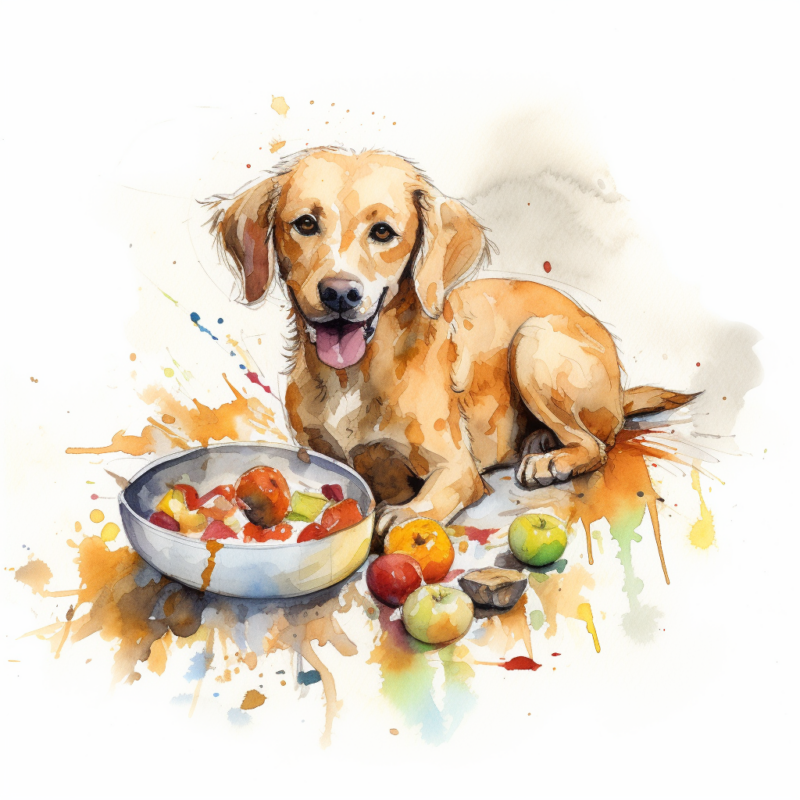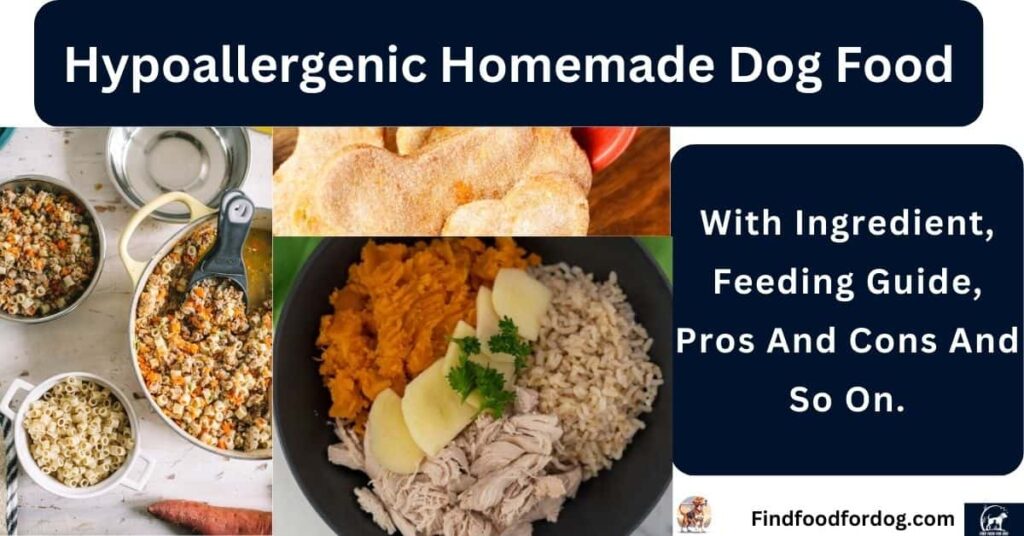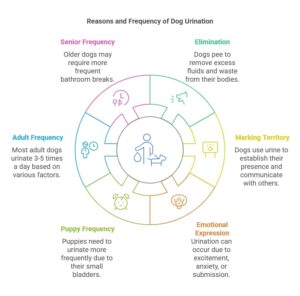Homemade dog food for kidney disease should be low in protein and phosphorus. Always consult a veterinarian before making dietary changes.
Kidney disease in dogs can significantly impact their health and quality of life. A specialized diet plays a crucial role in managing this condition. Homemade dog food allows pet owners to control ingredients and tailor meals to their dog's specific needs.
Focusing on low-protein and low-phosphorus ingredients helps reduce the workload on damaged kidneys. Incorporating fresh vegetables, healthy fats, and specific grains can support overall health. Owners must ensure that the diet remains balanced and meets all nutritional requirements. Careful planning and consultation with a veterinarian will ensure that your dog receives the best possible care through nutrition while managing kidney disease.

Customize Homemade Dog Food
Table of Contents
ToggleThe Need For Special Diets In Canine Kidney Disease
Canine kidney disease requires careful attention to diet. The kidneys filter waste from the blood. When they fail, waste builds up. A special diet helps manage this condition. Homemade dog food can be a great option. It allows you to control ingredients and nutrients.
Feeding your dog the right food can improve their quality of life. It can reduce symptoms and slow disease progression. A tailored diet can make a big difference.
Symptoms And Diagnosis
Recognizing kidney disease in dogs is essential. Common symptoms include:
- Increased thirst
- Frequent urination
- Weight loss
- Vomiting
- Loss of appetite
Veterinarians diagnose kidney disease through:
- Blood tests
- Urinalysis
- Ultrasound or X-rays
Early detection leads to better management. Regular check-ups can help catch symptoms early.
Benefits Of A Tailored Diet
A customized diet offers many benefits for dogs with kidney disease. Consider these key advantages:
| Benefit | Description |
|---|---|
| Reduced Protein | Lower protein levels lessen kidney strain. |
| Controlled Phosphorus | Lower phosphorus supports kidney function. |
| Increased Omega-3 Fatty Acids | Omega-3s can help reduce inflammation. |
| Enhanced Palatability | Homemade food can entice dogs to eat. |
Tailoring your dog's diet can improve energy levels. It can also enhance overall health. Consistency in feeding helps maintain stability.
Key Components Of A Kidney-friendly Dog Diet
A kidney-friendly diet is vital for dogs with kidney disease. This diet helps manage symptoms and improves their quality of life. Focus on the right ingredients to support kidney health.
Protein Quality Over Quantity
Choosing the right type of protein is crucial. High-quality proteins are easier for dogs to digest. They provide essential amino acids without overloading the kidneys.
- Lean meats like chicken and turkey
- Fish, such as salmon and mackerel
- Eggs, which are rich in protein
Limit the total amount of protein. Consult your vet for the right balance. Too much protein can stress the kidneys.
Importance Of Phosphorus Control
Phosphorus control is essential for dogs with kidney disease. High phosphorus levels can worsen kidney function.
| Food Type | Phosphorus Content (mg/100g) |
|---|---|
| Chicken (cooked) | 200 |
| Beef (cooked) | 210 |
| Fish (cooked) | 150 |
| Eggs | 200 |
| Rice | 5 |
Include low-phosphorus foods in their diet. Rice and some vegetables are great options. Always check with your vet for specific recommendations.
Safe Fruits And Vegetables
Feeding your dog a homemade food diet can help manage kidney disease. Choosing the right fruits and vegetables is essential for their health. Some options are safe and beneficial for kidney support. Others might be harmful. This section discusses safe choices for your furry friend.
Kidney-supportive Vegetables
Vegetables can provide vital nutrients. Here are some kidney-supportive options:
- Carrots – Rich in vitamins A and C.
- Green Beans – Low in potassium and high in fiber.
- Sweet Potatoes – Packed with antioxidants and vitamins.
- Peas – Good source of protein and fiber.
- Broccoli – Contains vitamins K and C.
These vegetables can help support kidney function. Always cook them well before serving. Avoid adding salt or spices. This ensures they remain healthy for your dog.
Fruits To Include And Avoid
Fruits can be a tasty treat. Some fruits are safe, while others should be avoided.
| Fruits to Include | Fruits to Avoid |
|---|---|
| Apples – Good source of fiber and vitamins. | Grapes – Can cause kidney damage. |
| Blueberries – High in antioxidants. | Cherries – Toxic to dogs. |
| Watermelon – Hydrating and safe in moderation. | Avocado – Contains persin, harmful for dogs. |
Choose safe fruits wisely. Wash them thoroughly before serving. Cut into small pieces to prevent choking.
Supplements For Support And Healing
Choosing the right supplements is crucial for dogs with kidney disease. They help support overall health and can promote healing. Two key areas to focus on are:
Omega-3 Fatty Acids
Omega-3 fatty acids are essential fats that provide many benefits. They can reduce inflammation and improve kidney function. Sources include:
- Fish oil
- Flaxseed oil
- Chia seeds
Consider the following benefits of Omega-3 fatty acids:
| Benefits | Description |
|---|---|
| Reduces Inflammation | Helps lower inflammation in the kidneys. |
| Improves Blood Flow | Enhances circulation to vital organs. |
| Supports Healthy Skin | Promotes a shiny coat and healthy skin. |
Vitamins And Antioxidants
Vitamins and antioxidants play a vital role in maintaining health. They help fight oxidative stress, which can harm cells. Important vitamins include:
- Vitamin E
- Vitamin C
- B Vitamins
Consider these key points about vitamins and antioxidants:
- Support immune function.
- Protect against cell damage.
- Aid in energy production.
Incorporating these supplements into a homemade dog food diet can help manage kidney disease effectively.
Homemade Recipes For Kidney Health
Feeding your dog a homemade diet can support kidney health. It allows you to control ingredients. You can choose fresh, nutritious foods. This section covers simple preparation tips and balanced meal ideas.
Simple Preparation Tips
- Always wash your hands before cooking.
- Use fresh, organic ingredients whenever possible.
- Cook meats thoroughly to eliminate harmful bacteria.
- Chop vegetables into small pieces for easy digestion.
- Store food in airtight containers to maintain freshness.
Balanced Meal Ideas
Creating balanced meals is key for kidney health. Here are some simple recipes:
| Recipe | Main Ingredients | Benefits |
|---|---|---|
| Chicken & Rice | Chicken, brown rice, carrots | Lean protein, low phosphorus |
| Turkey & Sweet Potatoes | Ground turkey, sweet potatoes, green beans | Rich in vitamins, low in sodium |
| Fish & Quinoa | Salmon, quinoa, zucchini | Omega-3 fatty acids, good for heart |
Consider these meal ideas:
- Mix cooked quinoa with boiled chicken.
- Blend mashed sweet potatoes with green beans.
- Combine fish with steamed carrots.
Keep meals varied and interesting. This helps maintain your dog’s appetite. Consult your vet for specific dietary needs.

Customize Homemade Dog Food
Transitioning To A Homemade Diet Safely
Changing your dog's diet can be challenging. A homemade dog food diet can help dogs with kidney disease. Transitioning safely is essential to avoid any health issues. Follow these tips to make the switch smoothly.
Gradual Changes To Avoid Upset
Sudden changes can upset your dog's stomach. Take a gradual approach to introduce the new diet.
- Start with a mix of old and new food.
- Use a ratio of 75% old food to 25% new food for the first few days.
- Gradually increase the new food portion.
- By the end of two weeks, aim for a 100% new diet.
This gradual change helps your dog adjust. Monitor for any signs of discomfort during this process.
Monitoring Your Dog's Response
Keep a close eye on your dog after transitioning. Watch for any unusual behaviors or symptoms.
| Observation | Possible Action |
|---|---|
| Vomiting or diarrhea | Reduce new food portion and consult your vet. |
| Loss of appetite | Try mixing in some favorite treats. |
| Increased thirst | Ensure fresh water is always available. |
| Behavior changes | Contact your veterinarian for advice. |
Tracking your dog's response is crucial. This will help ensure they adapt well to their new diet.
Working With A Veterinarian
Creating a homemade dog food diet for kidney disease requires careful planning. Partnering with a veterinarian is crucial. They provide expertise and tailored advice. This ensures your dog gets the nutrients they need.
The Role Of Professional Guidance
Veterinarians play a key role in managing kidney disease. They help in several ways:
- Assessing your dog's overall health
- Recommending specific dietary needs
- Monitoring kidney function regularly
- Adjusting treatments as needed
Take advice from Pet Expert Dr Marty
ESA Pet is an online service that helps you get a legitimate ESA letter
Pet vitamin supplements and grooming products
Regular check-ups help track progress. Your vet can suggest supplements or medications. They can also advise on food preparation methods. This support makes the diet effective.
Adjusting The Diet Based On Health Changes
Kidney disease can change over time. Diet adjustments may be necessary. Watch for signs that indicate changes:
- Increased thirst or urination
- Loss of appetite
- Vomiting or diarrhea
- Weight loss
Discuss any changes with your vet. They may recommend:
| Health Change | Diet Adjustment |
|---|---|
| Increased thirst | Lower protein, higher water content |
| Weight loss | High-calorie, nutrient-dense foods |
Maintaining communication with your vet ensures the best care. They can guide you in modifying the homemade diet as needed.

Customize Homemade Dog Food
Success Stories And Testimonials
Many pet owners have seen amazing results with a homemade dog food diet for kidney disease. Their stories inspire hope and provide guidance. These testimonials highlight how tailored nutrition can improve dogs' lives.
Real-life Improvements
Pet owners report various improvements in their dogs after switching to homemade diets. Here are some common benefits:
- Increased Energy: Dogs become more active and playful.
- Better Hydration: Fresh ingredients boost water intake.
- Healthier Coat: Shiny fur indicates better nutrition.
- Improved Appetite: Dogs show excitement for mealtime.
- Weight Management: Helps maintain a healthy weight.
Many owners share specific stories. For example, Bella, a 10-year-old Beagle, faced severe kidney issues. After switching to a homemade diet, her energy levels soared. Bella now enjoys walks and plays with her family.
Another story involves Max, a Golden Retriever. His owner, Sarah, noticed a significant reduction in vet visits. Max's kidney function improved, and his overall health flourished. Sarah credits the homemade diet for these changes.
Inspiration For Starting Your Journey
These success stories motivate others to explore homemade diets. They show that positive change is possible. Here are some tips to inspire your journey:
- Research Recipes: Look for kidney-friendly recipes.
- Consult Your Vet: Get professional advice before starting.
- Track Progress: Monitor your dog's health closely.
- Join Online Groups: Connect with other dog owners.
- Share Your Story: Inspire others with your journey.
Sharing experiences builds a supportive community. Your journey can inspire others to take action and improve their dogs' health.
Frequently Asked Questions About Homemade Dog Food Diet Kidney Disease
What Are The Benefits Of Homemade Dog Food For Kidney Disease?
Homemade dog food allows you to control ingredients and nutrients. It can help reduce phosphorus and sodium levels, which is essential for dogs with kidney disease. Tailoring meals to your dog's specific needs can improve overall health and enhance their quality of life.
Can I Use Regular Dog Food For Kidney Disease?
Regular dog food may not be suitable for dogs with kidney disease. These foods often contain high levels of protein and phosphorus, which can worsen kidney function. Choosing a specialized diet or homemade meals is crucial for managing your dog’s condition effectively.
What Ingredients Are Best For Dogs With Kidney Disease?
Opt for low-protein ingredients like rice, sweet potatoes, and carrots. Lean meats such as chicken or turkey can be included in moderation. Always consult your veterinarian for specific recommendations tailored to your dog's health needs and dietary restrictions.
How Often Should I Feed My Dog With Kidney Disease?
Feeding frequency can vary, but smaller, more frequent meals are often beneficial. This approach helps in easier digestion and nutrient absorption. Consult your vet for a tailored feeding schedule based on your dog’s health status and dietary requirements.
Customize Homemade Dog Food
Conclusion
A homemade dog food diet can greatly benefit pets with kidney disease. It allows for better control over ingredients and nutrition. Always consult your veterinarian before making changes. Tailoring meals to your dog's specific needs can improve their quality of life.
Prioritize their health and happiness with every meal you prepare.














